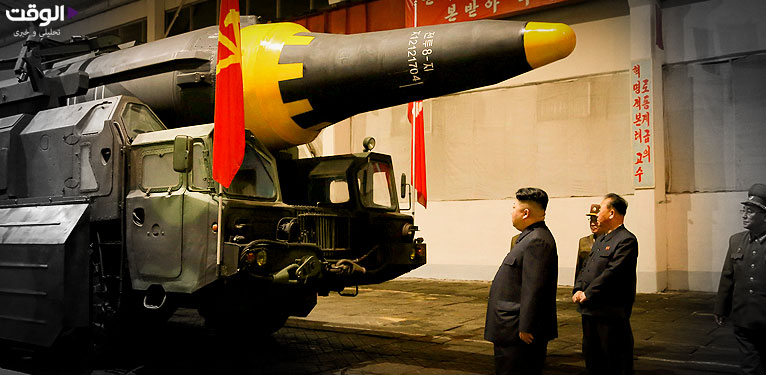Alwaght- The US stances on North Korea remain equivocal and contradictory even after the historic Singapore meeting last month between the American President Donald Trump and North Korean leader Kim Jong-un. Responding to the critics of the Singapore agreement between the two leaders, Trump said that Kim agreed to complete, verifiable, and irreversible denuclearization and insisted that "There is no longer a Nuclear Threat from North Korea." However, American spy agencies accuse Pyongyang of increasing production of fuel for nuclear weapons in secret sites and White House officials insist on maintaining pressures on The East Asian country.
In the middle of the already hazy situation, NBC Friday report that quoted five unnamed US officials as saying that in recent months North Korea had stepped up production of enriched uranium for nuclear weapons and that Pyongyang possesses at least three secret nuclear sites has darkened the outlook of a settlement to the Korean Peninsula crisis.
The Guardian newspaper, republishing satellite images taken on June 21 by North 38 monitoring group which brings in its spotlight North Korea’s missile and nuclear activities and home affairs, reported that infrastructure improvements at the Yongbyon nuclear plant were “continuing at a rapid pace.” “The cooling system for the plutonium production reactor has been modified and at least two new non-industrial buildings have been built on the site,” the newspaper continued.
What is behind the US reports on ongoing nuclear activities of the North? And how do they impact the course of denuclearization? Two scenarios are likely:
More pressures on Pyongyang
Washington is possibly seeking to put more strains on the North Korean leader by spreading the news about detection of his secret nuclear activities. This is possibly for the final aim of a big win in the denuclearization game. To put it differently, Americans want to fulfill their in exchange for smallest concessions. In fact, a fight of demands is going on between the two sides of the negotiations. While the North Korea insists on a step-by-step process to destroy its nuclear capabilities in return for concessions like lifting sanctions and being given security guarantees, the US stresses that Pyongyang should denuclearize all at once, similar to Libya disarmament model. Washington does not aim to remove its military forces and equipment from East Asia as a concession to Kim since they serve its strategic agenda in competition with China and even Russia in region. Trump administration's succeeds in foisting its desires on Kim and dismantling his country's nuclear and missile programs, means killing two birds with a single stone: ne removing the threats against its forces operating in the region and its regional allies and second saving its energy to check burgeoning China power gain in the region.
But meeting this goal takes unceasing US pressures on the opposite side, something China and Russia challenge with the argument that North Korea has taken adequate trust-building steps. Launching a campaign of blackening by telling the world that Kim does not stand on his commitments opens Trump’s hand to press Beijing and Moscow, the only parties with trade ties to Pyongyang, to adhere to the embargo.
The US Secretary of State Mike Pompano has recently called the Chinese Foreign Minister Wang Yi. He told his Chinese counterpart that they needed to fully commit to the United Nations Security Council’s resolutions on North Korea, including those banning coal and oil exports to the isolated nation. Top White House officials have already maintained that the economic pressures on Pyongyang will not be relaxed until a considerable progress is made in the course of its nuclear program dismantling.
Divides in US and efforts to foil the negotiations
Certainly, there is no consensus among the American politicians and the administration on handling the negotiations and viability of Singapore bilateral accord. Trump constantly accuses his critics, mainly politicians from the opposite party, of politicizing the case and turning a blind eye to the Singapore summit’s achievements. On the opposite side, many politicians doubt that Trump’s way of dealing with the North Korean leader will secure the US interests, arguing that Kim is dishonest and does not bow to the form of denuclearization claimed by the president. They support their argument by a flashback to the 2008 nuclear deal with Pyongyang. In 2008, the North invited the international journalists to record destruction of Yongbyon plant’s cooling tower. The site had debuted production of nuclear bombs. Then, it turned out that Pyongyang had a separate uranium enrichment site enabling it to continue bomb building.
Odds are that Trump’s agenda doubters, even those within his administration, are the main lobby behind the publication of evidence on Kim’s breach of the deal terms, to terminate the negotiations at the end of the road. A dominant climate of distrust in Trump’s ability to settle North Korea nuclear crisis led the Republican and Democratic members of the US House of Representatives a month ago to introduce a bill that would require President Donald Trump’s administration to provide a detailed report on North Korea’s nuclear program to set a “baseline” for progress on talks with Pyongyang.
Therefore, regardless of the validity of the news around Pyongyang’s secret nuclear activities, the key factor causing pessimistic atmosphere around the negotiations is fed by the type of US approaches and goals in the talks.



























